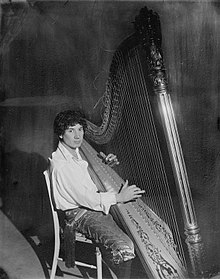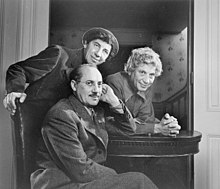Harpo Marx
[1] In contrast to the mainly verbal comedy of his brothers Groucho and Chico, Harpo's comic style was visual, being an example of vaudeville, clown and pantomime traditions.
[10] The turn-of-the-century tenement that Harpo later called "the first real home I can remember"[11] was situated in a neighborhood populated with European immigrants,[12] mostly artisans.
His mother was from East Frisia, Germany,[19] and his father, a tailor,[20][21] was from Alsace, which was part of the Second French Empire at the time the elder Marx was born and for most of his childhood.
[22] Harpo received little formal education and dropped out of New York Public School 86 at age eight (mainly due to bullying)[11] during his second attempt to pass the second grade.
In his memoir, Groucho wrote that Harpo simply was not very good at memorizing dialogue, and thus was ideal to portray the archetypal vaudeville role of the "dunce who couldn't speak.
[11] The major exception was Mildred Dilling, the professional harpist who finally taught Harpo proper harp technique and collaborated with him regularly when he had difficulty composing.
[11] Unlike Chico, Harpo could play only two songs on the piano, "Waltz Me Around Again, Willie" and "Love Me and the World Is Mine",[32] but he adapted this small repertoire in different tempos to suit the action on the screen.
[34] Ultimately, he relinquished the piano to Chico in favor of his trademark harp, upon which he performed Nacio Herb Brown's 1935 song "Alone", which was sung in the film by Kitty Carlisle and Allan Jones.
[65] His non-speaking in his early films was occasionally referred to by the other Marx Brothers, who were careful to imply that his character's not speaking was a choice rather than a disability.
[67] In The Cocoanuts, this exchange occurs:[68] In later films, Harpo was repeatedly put in situations where he attempted to convey a vital message by whistling and pantomime,[4] reinforcing the idea that his character was unable to speak.
[71] During this time he served as a secret courier,[72] delivering communiques to and from the US embassy in Moscow at the request of Ambassador William Christian Bullitt Jr.,[73] smuggling the messages in and out of the Soviet Union by taping a sealed envelope to his leg beneath his trousers.
[74][75] Marx recounted his relief at his voyage's end: "I pulled up my pants, ripped off the tape, unwound the straps, handed over the dispatches from Ambassador Bullitt, and gave my leg its first scratch in ten days.
[77] Walt Disney would later feature Harpo (with Groucho and Chico) as one of King Cole's "Fiddlers Three" in the Silly Symphony Mother Goose Goes Hollywood.
Friz Freleng's 1936 Merrie Melodies cartoon The Coo-Coo Nut Grove caricatured Harpo, one of multiple celebrities appearing as an animal, as a bird with a red beak who chases a "woman" who is later revealed to be Groucho.
[84] Harpo made television appearances through the 1950s and 60s, including a 1955 episode of I Love Lucy, in which he and Lucille Ball re-enacted the famous mirror scene from Duck Soup.
[87] Harpo and Chico appeared in the May 8, 1959, episode of General Electric Theater entitled "The Incredible Jewelry Robbery" entirely in pantomime.
[100] His final role, opposite show star Fess Parker, was as himself on the October 20 episode, "Musicale", of ABC's sitcom Mr. Smith Goes to Washington[101] (based on Frank Capra's film of the same name).
[102] Harpo's September 28, 1936, marriage to actress Susan Fleming became public knowledge the next month due to a congratulatory telegram sent by President Franklin D.
"[110] Harpo was good friends with theater critic Alexander Woollcott,[111] alongside whom he became a regular member of the Algonquin Round Table.
In fact, radio and TV news recordings of his voice can be found on the Internet,[116] in documentaries,[117] and on bonus materials of Marx Brothers DVDs.
[citation needed] A reporter who interviewed him in the early 1930s wrote that Harpo "had a deep and distinguished voice, like a professional announcer", and like his brothers, spoke with a New York accent his entire life.
His son, Bill, recalled that in private, Harpo had a very deep and mature soft-spoken voice, but that he was "not verbose" like the other Marx brothers, instead preferring to listen and learn from others.
[122] Comedian Steve Allen, who was in the audience, remembered that Harpo spoke for several minutes about his career, and how he would miss it all, and repeatedly interrupted Sherman when he tried to speak.
[31] His remains were cremated[42] at the Hollywood Forever Cemetery and a portion of his ashes were allegedly scattered in the sand trap at the 7th hole of a golf course in Rancho Mirage, California.
[124] His talent extended to piano and clarinet[127] (on which he played When My Dreams Come True in The Cocoanuts),[128] which, as he had with the harp, Harpo mostly learned independent of professional instruction.
[129] Marx's son Bill went on to display his own musical abilities, performing his own compositions on piano live in concert alongside harpist Carrol McLaughlin.
[133] The show focused on the early days of the Marx Brothers' act and the importance of their mother Minnie's strong hand in guiding and molding them into a successful vaudeville and film comedy team.
[134] Actress Priscilla Lopez played Gino,[135] a character based on Harpo,[136] in 1980's Broadway send-up of Hollywood filmmaking A Day in Hollywood/A Night in the Ukraine.








